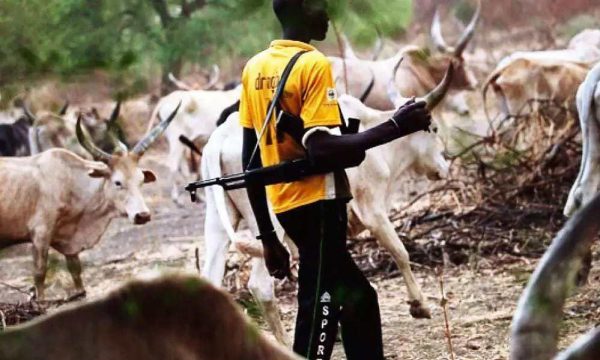AfriqueCAN
At least six people have been reported dead and several others injured following two separate attacks by armed herdsmen on the Iwari and Olegagbane communities in Agatu Local Government Area of Benue State.
According to a local source who spoke on condition of anonymity, the incidents occurred on Friday evening. The source explained that the attack on the Iwari community claimed one life, while five others were killed in the Olegagbane community.
“In recent times, Agatu communities have faced repeated assaults by these marauders, who strike intermittently and then retreat.
“On Friday, the armed herdsmen attacked the Iwari community, killing one person and injuring several others. The same day, they struck the Olegagbane community, killing five people and wounding several others without any provocation,” the source told DAILY POST.
The attackers reportedly disappeared after the assaults, but locals identified them as armed herdsmen.
Mr. Phillip Ebenyakwu, chairman of Agatu LGA, confirmed the incidents and expressed concern over the ongoing violence in the area.
“The attackers come, kill, steal, loot, and then flee. I do not know their motives, but these attacks are unbearable. I am in communication with security agencies, and they are working on it,” he said.
Ebenyakwu also lamented the displacement of over 2,000 people from seven affected villages, noting the challenges in managing the displaced population.
“The number of displaced people is overwhelming. Although the State Emergency Management Agency provided some relief materials, it was not sufficient,” he added.
Meanwhile, Police Public Relations Officer Superintendent Catherine Anene stated that she had not yet received information on the attacks.
When Adiaratou Iglesias crossed the finish line at the Tokyo 2020 Paralympic Games, she did not know she had bagged a gold in the women’s 100-metre T13 race until she was told.
The visually impaired Spanish athlete, who goes by Adi and also won a 400m silver in Tokyo, said she now dreamed of hearing her adoptive family shout “gold” when she completes her races at the Paris Games this week.
Iglesias was born in Mali with albinism, a genetic condition that inhibits the production of melanin which pigments the skin, hair and eyes. Albinism impairs her visual perception by 90%, but thick corrective eyewear allows her to see around 20%.
“I don’t know anything when I cross the finish line because I can’t see what’s on my sides,” the 25-year-old told Reuters.
Iglesias said her biological parents decided to send her to Spain when she was 11 to prevent her from suffering attacks based on her albinism.
In some countries in sub-Saharan Africa, people with albinism are sometimes killed for their body parts, which are prized in ritual witchcraft.
As a child, Iglesias used to run errands for her mother in Bamako, and she invariably did it as quickly as possible.
“I’ve always loved running and been passionate about it but I couldn’t (practice athletics) due to life circumstances until 2014,” she said, crediting the support from her adoptive mother, Lina Iglesias, without which “this never would’ve been possible.”
After spending time at a children’s shelter in northern Spain, Iglesias was adopted in 2013 and moved to the northwestern city of Lugo, obtaining Spanish citizenship.
Lina, 60, held back tears and beamed with pride when asked what it would mean to hug her daughter after winning in Paris. “It’d be a big thrill for me but not much more than what I feel each time I see her run or win.”
Last year, Iglesias — who is a fan of Spanish tennis star Rafael Nadal — was invited by the European Commission to talk about combatting hate speech and hate crimes.
Despite spending most of her time at a high-performance center for elite athletes in Madrid, she wants to keep her medals — which include two golds from the 2021 European Championships and two silvers from the 2019 World Championships — in her childhood room in Lugo.
“It’ll be my museum, and it makes (Lina) very happy,” Iglesias said while sitting on her bed.
